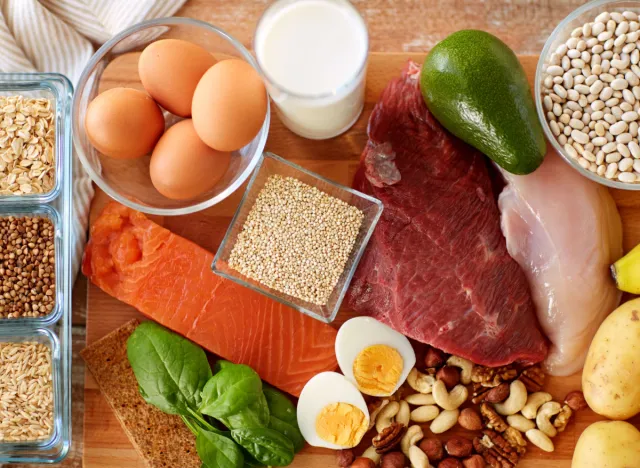If you find yourself eating less-than-ideal snacks or packing in the calories later on in the day, then you might not just be craving more food. Your body might actually be in need of protein, according to a new study.
The study that was published in the journal Obesity involved an analysis of data from the National Nutrition and Physical Activity Survey, which took place between May 2011 to June 2012. Taking into consideration the dietary and physical habits of 9,341 adults with a mean age of 46.3 years old, scientists from the University of Sydney found that the energy intake of the participants' diets was generally made up of 30.9% fat, 43.5% carbohydrates, 18.4% proteins, 4.3% alcohol, and 2.2% from fiber.
Those behind the study also found that participants who didn't eat as much protein during breakfast (or their first daily meal) ate more during the rest of the day than participants who ate more protein earlier on. High-protein breakfast eaters also ended up eating less as the day went on.
Researchers also discovered that the participants who didn't eat enough protein early in their day ended up eating not only more calories throughout the day, but they also ate more foods that were high in fat, sugar, and salt; consumed more alcohol; and ate less healthy foods like grains, vegetables, legumes, fruit, dairy, and meats.

The researchers discovered that one of the reasons why study participants did not consume adequate levels of protein was likely due to a high intake of processed foods. This high intake of low-quality processed foods crowds out protein foods that promote satiety, curb overconsumption of caloric, nutrient-poor foods, and reduce obesity risk.
"It's increasingly clear that our bodies eat to satisfy a protein target," said Professor David Raubenheimer, the Leonard Ullmann Chair in Nutritional Ecology at the School of Life and Environmental Sciences and one of the authors of the study, in a statement to EurekAlert! "But the problem is that the food in Western diets has increasingly less protein. So, you have to consume more of it to reach your protein target, which effectively elevates your daily energy intake."
Lead author Dr. Amanda Grech, a Postdoctoral Research Fellow at the University of Sydney's Charles Perkins Centre and the university's School of Life and Environmental Sciences, also noted, "As people consume more junk foods or highly processed and refined foods, they dilute their dietary protein and increase their risk of being overweight and obese, which we know increases the risk of chronic disease."
When Eat This, Not That! spoke to Kylene Bogden, RD, co-Founder of FWDfuel, Pureboost ambassador, and the nutritionist for the Cleveland Cavaliers, she told us that she wasn't surprised by the results.
"These findings are incredibly accurate," Bogden says. "Many of us consume processed food multiple times a day, day after day, thus leading to chronic inflammation and nutrient deficiencies. When our body is chronically inflamed and we are ridden with deficiencies, we may experience fatigue, strong sugar cravings, and the inability to lose weight."
When it comes to how foods high in protein, fats, and carbohydrates affect your body differently, as well as why the latter two can potentially lead to obesity, Bogden notes that "simply breaking down protein burns the most calories, fat comes in second place, and carbohydrate comes in third." She says that "part of this slower digesting process is also that adequate protein intake is necessary for optimal blood sugar control and stable blood sugar makes weight loss a smoother process."
No comments:
Post a Comment